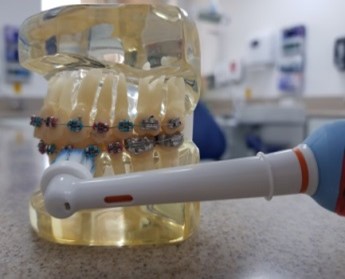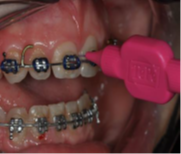Advice for Looking After your Fixed Brace
This leaflet has been written for patients who have just had their fixed brace fitted. Braces will straighten your teeth, but you need to take special care to look after them.
Responsibilities
What are my responsibilities?
- Clean your teeth
- Be careful about what you eat
- Attend all your appointments
- Take care of your brace
- Let us know if your brace breaks
- Keep attending your dentist for check-ups
- Keep us up-to-date on any changes of your address, phone number, dentist or doctor.
What will it be like at the beginning?
Should it be hurting?
- Your brace will probably start to make your teeth ache this evening
- The pain is at its worst at bedtime and when you first wake up tomorrow morning
- This is normal, as the teeth are starting to move.
How long will it hurt for?
- The pain usually lasts for two to three days.
What can I do to make it hurt less?
- Painkillers will make things better
- Our research project has shown that ibuprofen is the best painkiller. Remember to follow the instructions on the packet, including taking ibuprofen with food. Some people who have asthma should avoid ibuprofen
- You can take paracetamol or any other painkiller that you would take for a headache
- Some people choose to take both ibuprofen and paracetamol in the first few days
- It is best to avoid hard foods for the first few days as biting can make the pain worse.
What can I do if it is rubbing?
- We have given you some wax to use
- The wax does not actually stick to the brace so you have to mould it around the brace
- It tends to come off when you are eating
- Do not worry if you swallow it – it will not do you any harm.
Cleaning the brace
Electric (not battery) toothbrushes are slightly better than normal toothbrushes. Good electric brushes have a small round head, for example the Braun Professional Care 2000® or the Philips Sonic® small headed brush.
A manual toothbrush should have a small head and medium bristles.
You will also need extra brushes which are smaller and will help you clean around your brace.
- ‘Interdental’ brushes such as TePe® brushes come in different sizes. You will probably need green interdental brushes to clean the larger spaces and blue interdental brushes to clean the smaller spaces
- Use the widest interdental brush which will fit in that space (you will quickly work out which size works best where).


How often should I clean?
- It is best to clean your teeth each time you have something to eat
- This means cutting down on snacks between meals
- You may wish to buy a travel toothbrush so that you can clean at lunchtimes
- You should use your interspace toothbrush and/or interdental brushes at least twice a day.
Should I use mouthwash?
- Yes; it is a good idea to use a mouthwash with fluoride once a day
- Use it at a different time to when you brush your teeth
- A mouthwash is better than nothing if you cannot clean your teeth after a meal.
Should I use disclosing tablets?
- Disclosing tablets can help you to check that your cleaning is up to standard
- These contain a dye, which sticks to dental plaque and shows the areas you need to clean
- You can use them once a week or more frequently if we ask you to.
Can I get more advice about cleaning?
- Our oral health educator and hygienist are available for advice
- Let us know if you would like some help.
Diet
Are there any foods I should avoid?
- Certain foods can damage your brace
- These include toffees which can stick to the brace
- Avoid biting into foods with your front teeth eg apples, crusty rolls or pizza crusts
- Break or cut these foods into small pieces and chew them on your back teeth.
What about sweet things?
- Eating sweet foods increases your chance of getting white or brown marks on the teeth (demineralisation)
- These marks will spoil your smile
- It is not only the total amount of sugar that you eat that counts. It is also the type of food that contains the sugar, for example, sticky foods will cling to the teeth and the sugar will stay in the mouth for longer
- Also the amount of times per day that you eat sugary foods is important eg eating mints all day is worse for your teeth than having an occasional chocolate bar.
Which foods contain sugars?
- The most obvious ones are sweets, biscuits and chocolate
- But many other foods also contain sugar (described as ‘hidden sugars’)
- Good examples of these include breakfast cereals and tomato ketchup
- You should read the label on all foods to avoid these ‘hidden sugars’
- Also watch out for dried fruit, like raisins or sultanas.
What about drinks?
- Many drinks also contain sugar
- The worst culprits are fizzy drinks
- Not only do these contain sugar, but also acids which dissolve the teeth
- Even ‘diet’ drinks are damaging as they still contain acids
- Fruit juices are also acidic but are not quite so harmful. You should not drink fruit juices more than once a dayand it is best to dilute them with water
- You should not add sugar to tea or coffee.
Does this mean I cannot have sugar at all?
- To cut all sugar from your diet is very difficult
- You can have sugary foods or drinks as a treat, once in a while
- If you are going to have chocolate or sweets, have them after a meal and eat them all at once rather than over a period of time
- Then clean your teeth soon after
- However, if you drink fizzy pop, do not clean your teeth straightaway; wait at least 20 minutes as the acids soften the tooth surface and brushing then removes the softened enamel.
Should I still visit my dentist?
It is important that you keep visiting your dentists for regular check-ups whilst your braces are on. If you change your dentist, then please let us know.
What happens if I miss an appointment?
If you miss an appointment, we will try to rebook you as soon as possible. Because our clinics are busy this usually takes a few weeks and this may extend your brace treatment. If you miss more than one appointment, you will receive a letter which will be copied to your dentist and doctor. It is your responsibility to get in touch with us to rebook.
What happens if my brace breaks?
Who should I phone?
- Please phone our receptionist if your brace has broken
- The numbers and our opening times are on the back page
- At busy times, or out of hours, you can leave a message on our answer machine.
How urgent is it?
- Unless the broken brace is digging in and hurting, most repairs can wait for a few days
- However, we would much rather see you to repair it before your next routine appointment.
How can I make it more comfortable?
- You can use your wax to make the brace comfortable.
What should I do if I am on holiday?
- Always take your wax with you when you go away
- It is very rare to need your brace repaired by another orthodontist
- If it is very uncomfortable then sometimes an emergency dentist can help
- Otherwise contact us as soon as you get home.
How can I stop it breaking again?
- Avoid hard foods
- Avoid biting your finger nails
- Avoid chewing pens
- Avoid using your teeth as tools eg opening the tops of sports bottles.
Where can I get more advice?
- If you have any questions, you can talk to our hygienist or oral health educator
- Your orthodontist can answer any questions you have
- We also have a computer in our waiting area with lots of information on braces.
Gum shields
- We recommend that you wear a gum shield for any sport or activity where you may get hit in the mouth, such as rugby or hockey
- An orthodontic gum shield that can be softened in hot water and moulded to your teeth should be adequate
- You may need to buy a slightly bigger size to fit around the brace
- If you play a lot of sport, you may wish to try one of our custom-made gum shields which can be adapted to fit around the teeth and brace but still allow them to move. These cost between £30 and £35
- Ask your orthodontist if you would like one and we will arrange to take a mould of your teeth.
Contact numbers
We hope you have found this information useful, but if you have any questions or are worried about anything, please speak to the orthodontic team:
Orthodontic Department (Dorset County Hospital): 01305 2551747
Orthodontic Department (University Hospitals Dorset): 0300 019 4694
About this leaflet
Author: Pamela Ellis, Consultant Orthodontist
Written: March 2021
Approved: April 2021
Review date: March 2025
Edition: v2
If you have feedback regarding the accuracy of the information contained in this leaflet, or if you would like a list of references used to develop this leaflet, please email patientinformation.leaflets@dchft.nhs.uk
Print leaflet